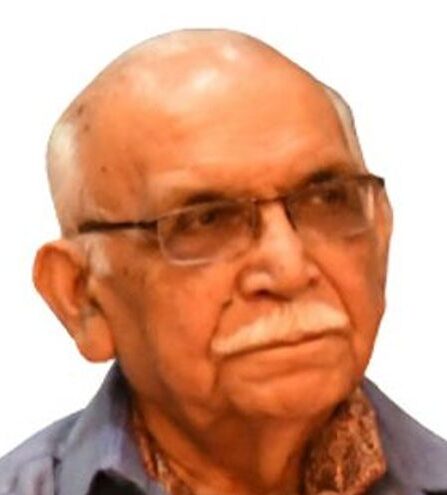Art & Soul by BN Goswamy: Looking for positivity amid the churning
I am no politician. Not even from a long distance. But while glancing at the news, day after day, like everyone does, one begins to dangle between hope and apprehension. For there is such a stirring all around. Such churning — iss shahar mein har shakhs pareshan sa kyun hai — that one looks for positivity. So many good things have happened all around us and are continuing to happen; at the same time, there are things that are worrying, or views with very mixed feelings. So, one looks for positivity and settles upon something. I look for it most often in poetry. I do not care where that poetry comes from — from Russian to Czech, from English to Burmese, from Spanish to Italian, from Hindi to Urdu. While searching, I came upon a poem in Hindi-ised Urdu, which looks at things with sharpness and sympathy. And I wish to share it. This is how it begins.
Jab dukh ki nadiya meñ ham ne
jivan ki naao daali thi
tha kitna kas-bal bañhoñ meñ
lahoo meñ kitni laali thi
yuñ lagta tha do haath lage
aur naav puram paar gayi
aisa na hua keh dhare meñ
kuchh andekhi mañjdhareñ thiñ
kuchh mañjhi the anjaan bahut
kuchh anparkhi patvareñ thiñ
ab jo bhi chaho chhan karo
ab jitne chaho dosh dharo
nadiya to vahi hai, naao vahi
ab tum hi kaho kya karna hai
ab kaise paar utarna hai?
Is desh ki chhati par ham ne
sadiyon ke ghaao dekhe the
tha vaidoñ par vishvas bahut
aur yaad puraane nuskhe the
yuñ lagta tha bas kuchh din meñ
saari bipta kat jaegi
aur sab ghaao bhar jaeñge
aisa na hua ki rog apne
kuchh itne dher purane the
vaid unki teh ko pa na sake
aur totake sab bekar gae
ab jo bhi chaho chhan karo
ab jitne chaho dosh dharo
chhati bhi vahi hai, ghaao vahi
ab tum hi kaho kya karna hai?
ye ghaao kaise bharna hai?
Even though it should be simple to understand, I worry about things being missed. So, I have done in my poor words a translation into English of the poem. And this, with all its flaws, is how it reads.
What do we do now? Where do we go?
When we launched the boat of our lives
in the stream of sorrow
It seemed
that it was not going to be hard.
There were rippling muscles in our arms
And hot blood was raging inside us.
We were so confident
Sure we were that we will be able to get across that stream of sorrow:
A few determined strokes with oars by our boatmen,
And there we shall be: on the other shore.
But did it happen like that?
Of course not!
We had not counted upon
There were eddies and whirlpools
in the middle;
And the boatmen knew not enough;
Nor were the oars truly tested.
We were stuck.
We were faced with a situation
Where do we lay the blame?
How do we get across?
By blaming the poor boatmen?
By conducting endless investigations?
The stream was the very same
So was the boat: how do we get across?
Likewise:
We knew that the broad breast of our land
Was lacerated with festering, ages-old wounds
And
We kept trusting our hoary old physicians
And time-soaked texts
For cures
For getting magically healed.
But did it happen like that?
Of course not!
Now, we are faced with the situation:
Where do we lay the blame?
Where lies the cure now?
The wounds were so deep, and went back too many aeons of time
That the physicians were unable to help
And all the prescriptions went waste.
What do we do now?
Keep blaming the old physicians?
Or those texts?
The breast of our land still
bears those gashes.
Do we do something different now?
It is up to us.
If not all, so many poets have commented upon the times they lived in. When the British were here, Ghalib wove in his pain, his desperation in his poems; Mir Taqi Mir, uprooted and harassed — Kya bood-o-baash poochho ho purab ke sakinon/humko gharib jaanke, hans hans pukar ke?/Dilli jo ek shehar tha alam mein intekhwab, rehte the jahan muntakhib sab rozgaar ke/usko falak ne loot ke veeran kar diya/ hum rehne wale hain usi ujadee dayaar ke [Are you asking me where I come from (you who live peacefully) in the east, seeing me in this ragged state? I come from Dilli, once the choicest city in the world; home of the choicest of men. That Dilli is now in ruins as the fates have willed. Yes, I come from that desolate place!]. Questions hung about in our land, in the ancient times too: Kim-karomi kva gachhaami? [What shall I do? Where should I go?]. Bhartendu Harishchandra began: Hum kaun the kya ho gaye hain, aur kya honge abhi/aao vicharein aaj milkar ye samasyaein sabhi [Who and what we were; what have we turned into; and what we will be? Let us all sit down together and mull over these questions]. Iran, Scotland, Africa, Latin America: everywhere.
The poem I have drawn attention to makes a statement, throws a challenge, provokes, and asks a question: Ab tum hi kaho kya karna hai? All these things are addressed to no one in particular, no individual, no community, no group. And yet to everyone. I sense that the poet had the young generation especially in mind.
So here we are.









